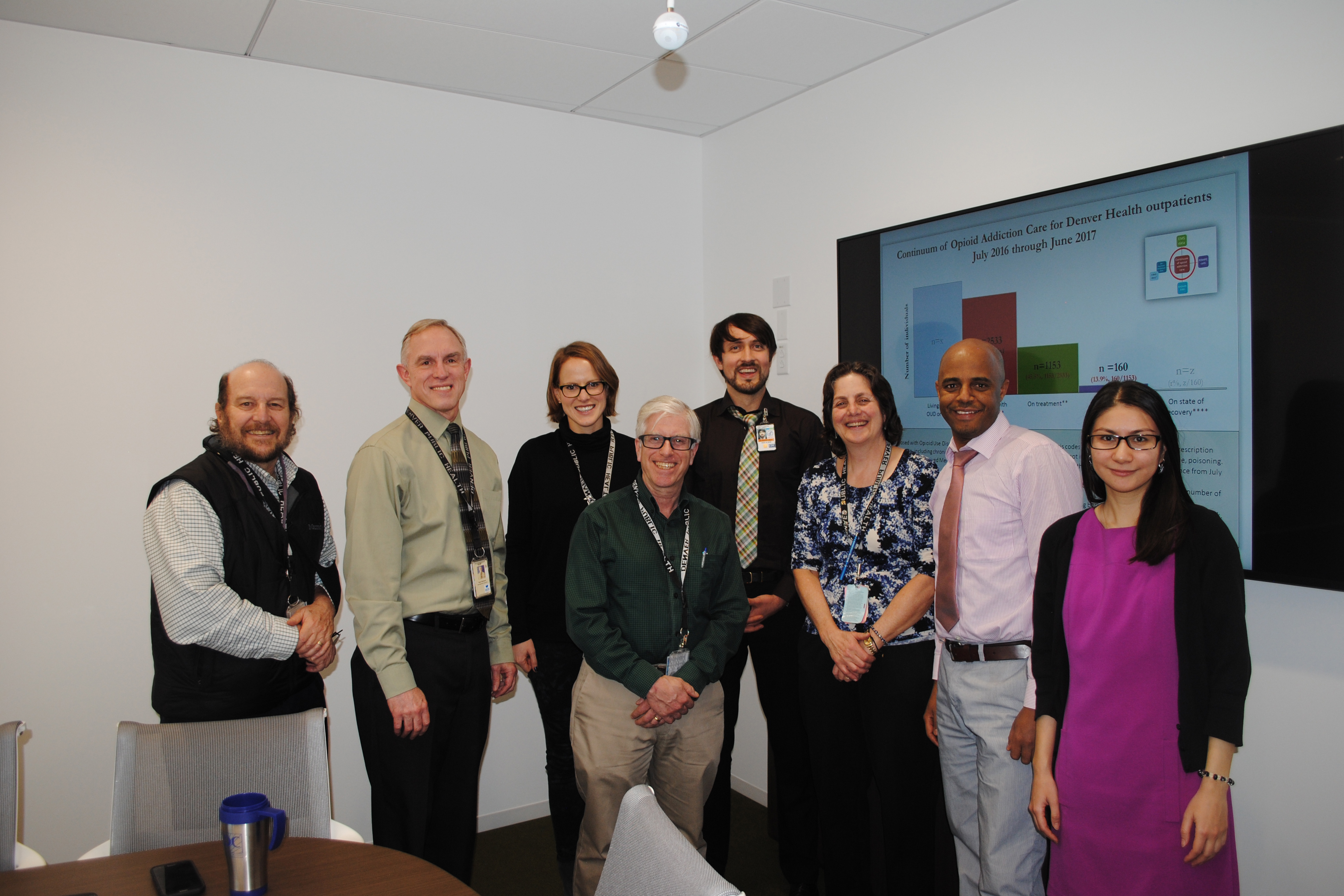Pilot Program

The combined team of CDC fellows and staff at the Denver host site (l-r): Arthur Davidson, Dean McEwen, Emily McCormick, Seth Foldy, José Tomás Prieto, Judith Shlay, Wollelaw Agmas, and Aziza Arifkhanova.
In 2017, two health departments served as pilot sites and each engaged a multidisciplinary team of fellows to examine a priority health problem identified by the community. Additionally, a team of subject matter experts at CDC provided technical assistance to strengthen population health workforce capacity plans with the Mississippi Department of Health.
Advancing work on Denver’s opioid epidemic
“This collaborative work with the fellows and our Denver Public Health staff has helped to support the launch and implementation of Denver Health’s Center for Addictions Medicine which will offer a full continuum of care that provides the Denver Health patient access to an array of substance treatment services, through no wrong door. Our public health team will lead the evaluation of the Center and will use the work of the fellows to help guide the Center’s ability to ensure comprehensive care for all patients and families affected by opioid use disorder.”
Judith Shlay, MD, MSPH, associate director of Denver Public Health and project team lead
Footnote:
*Dr. Wollelaw (Wolle) Agmas is no longer with Denver Public Health. However, he was an integral part of this activity during his time there.
“The fellows have catalyzed efforts to integrate our public health practices with Utah Medicaid, showing the value of integration to both parties in improving the health of all Utah citizens.”
Angela Dunn, MD, MPH, Utah State Epidemiologist, and Class of 2014 EIS officer
Footnote:
*Drs. Roberta Horth and Carl Grafe are no longer with the Utah Department of Health. However they were an integral part of this activity.
In 2016, more than 63,000 people died from drug overdoses, making it the leading cause of injury-related death in the United States. In Denver, the US age-adjusted death rate for drug overdose mortality in 2016 was 19.8 per 100,000 compared to Colorado’s rate of 16.6 per 100,000 residents, making Denver one of the highest impacted cities in Colorado. Three fellows were selected to work alongside the Denver Public Health staff:
- Dr. Wollelaw (Wolle) Agmas, Preventive Medicine Residency/Fellowship*
- Dr. Aziza Arifkhanova, Prevention Effectiveness Fellowship
- Dr. José Tomás (JT) Prieto Public Health Informatics Fellowship Program
Once on site, the fellows dove into the project. Working with their health department supervisor, they attended meetings and conducted interviews with key internal Denver Health and external stakeholders to grasp the extent of the opioid issues in Denver. The fellows attended trainings and visited relevant institutions to assess community needs and define the struggles inherent in solving the opioid crisis.
A key problem quickly became clear. While Opioid Use Disorder (OUD) is defined as a problematic pattern of opioid use leading to clinically significant impairment or distress (also referred to as opioid abuse, dependence, or addiction), there was a lack standard definitions and coding and documentation practices for OUD and opioid misuse within the health department and community. This led to confusion among providers, payers, and policy makers. Standardized definitions and coding and documentation practices are needed for Denver community stakeholders to accurately measure the problem and effectively coordinate treatment and policy interventions.
The interdisciplinary fellowship team applied their individual areas of expertise in informatics, economics, and clinical care in parallel with a holistic approach to address Denver’s opioid epidemic. Working together with key partners and community stakeholders, the team has laid out a tiered plan to address the problem.
- Short-term: Develop an operational definition of OUD and misuse at Denver Health.
- Mid-term: Implement a standardized process to report and measure the burden, treatment progress, and gaps of OUD and misuse.
- Long-term: Decrease opioid misuse, OUD, and opioid deaths.
Collaborating to end Utah’s super utilizer crisis
The fellowship team assigned to Utah Department of Health, stationed in Salt Lake City, began work to understand the Medicaid super-utilizer problem and possible interventions. Super-utilizer refers to the small portion of the population that makes up a large portion of emergency room or hospital visits, and therefore strains public health budgets. At the Intermountain Clinic in Murray, UT, epidemiologists found that only 1 percent of their patients accounted for nearly 24 percent of patient costs, and 5 percent accounted for 51 percent of costs. These numbers are striking and Utah needed to learn more to address this issue. What are the characteristics of this patient population? What is causing the higher costs with this population? Are there ways to improve this situation?
The fellows assigned to this team include
- Dr. Roberta Horth, Epidemic Intelligence Service officer*
- Dr. Carl Grafe, Public Health Informatics Fellowship Program*
- Dr. Srimoyee Bose, Prevention Effectiveness
This team is working together and with the Utah to identify the super-utilizers of the Medicaid system and ways to connect them with more appropriate care, thereby reducing the costs and improving the health outcomes of the individuals and the greater population. Their plan includes three objectives:
- Define and identify super-utilizers.
- Group and characterize the super-utilizer population.
- Identify and model potential interventions.